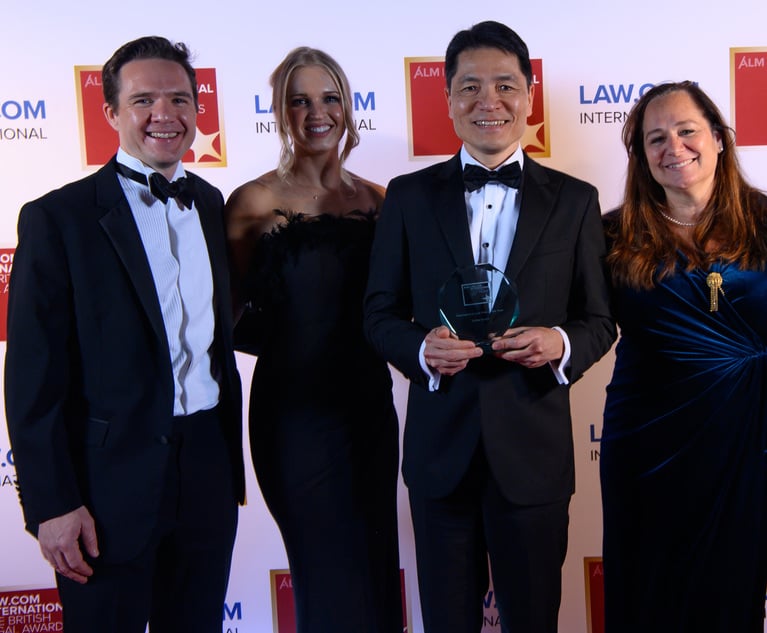Clifford Chance uses lockstep 'super points' to reward top performers as offices face profit share cuts
Firm goes above lockstep in London and New York with multiple partners also moved down
February 23, 2017 at 05:32 AM
4 minute read
Clifford Chance (CC) has broken its core lockstep in London and New York to use the 'super-point' tier reserved to reward star performers, with the news emerging as the firm considers placing some of its international offices on a lower rung of its lockstep to boost profitability.
The magic circle firm, which overhauled its three-tier lockstep system in 2015, has long had the ability to reward top-performing partners by moving them above its core 100-point plateau, but has previously opted against such a move – even for lateral hires in the highly competitive US market.
However, this stance has changed in recent months, with at least one partner in London and the US now receiving either 115 or 130 points, according to former partners.
"Super points have been used recently, especially in the US, and in one or two other special cases where people's practices have performed well over a sustained period," said one source close to the firm.
An ex-partner added: "I heard that more than one London plateau partner was going to get super points last year and I heard it had happened earlier this year. They are rewarding London superstars so that they stay."
He also said some partners in New York were handed super points.
The firm's decision to use the top rung of its three-tier lockstep comes as plateau partners across the firm's network are seeing their positions on the lockstep reviewed, with German partners already set for a cap at 70 points instead of 100, and similar moves expected elsewhere.
Many partners in offices across continental Europe, the Middle East, Australia and parts of Asia are expected to see their positions capped at 70 points from May, as a result of a review that started around October last year.
CC's Beijing and Hong Kong offices are not thought to be affected, but Legal Week understands that the firm is looking to drop all Germany, Australia and Dubai plateau partners down to 70 points from 2017-18.
Plateau partners in London are also understood to be at risk.
"They have been aiming for a very significant culling of points," said one former partner, adding that the firm wanted to cut more than 10% of points in circulation to boost average profit per equity partner (PEP).
CC increased PEP by 9.8% during the last financial year to reach £1.23m, although it still lags magic circle rivals such as Freshfields Bruckhaus Deringer and Linklaters, which posted 2015-16 PEP of £1.47m and £1.46m respectively.
The lockstep review comes after CC partners first voted through a proposal in May 2015 enabling the firm to take advantage of super points to retain more star talent, while also nudging down underperformers.
At that time, a number of City partners were moved from 100 points to a new 70-point gateway, from which they are able to climb back to 100 points, subject to performance.
The firm also has a lower lockstep ladder capped at 70 points in place in some jurisdictions, such as eastern European offices including Warsaw, Prague and Budapest.
Former partners said it was not yet clear whether the international offices under review would be moving to the lower lockstep ladder or that it would just be partners seeing their pay cut back to the 70-point gateway. Individual star performers in these offices will still be able to attain 100 points, according to ex-partners.
One ex-partner said: "They have demoted partners off the plateau down to 70. They get held for a bit there, but there's a possibility to go up. There was concern previously about demoting individuals – some people liked the idea of moving an office, as it is less of a personal affront."
One current CC partner added: "There's a lot of thinking about adapting the system to the market situation. There is a delicate balance between treating partners the same way or more individually."
The lockstep review comes after CC carried out a restructuring in Germany in 2015 that saw around nine partners exit the firm that year. The review, the firm's largest region-specific appraisal in years, was focused mainly on the local corporate practice.
CC declined to comment.
This content has been archived. It is available through our partners, LexisNexis® and Bloomberg Law.
To view this content, please continue to their sites.
Not a Lexis Subscriber?
Subscribe Now
Not a Bloomberg Law Subscriber?
Subscribe Now
NOT FOR REPRINT
© 2025 ALM Global, LLC, All Rights Reserved. Request academic re-use from www.copyright.com. All other uses, submit a request to [email protected]. For more information visit Asset & Logo Licensing.
You Might Like
View All
Ogletree Deakins Launches Office in Calgary, Canada With Two Partners From McCarthy Tétrault
3 minute read
EY Law Launches in Portugal, Targets 40 Lawyers by End of 2025


International Law Firm of the Year: A Q&A with Sidley Austin's London Managing Partner
5 minute readTrending Stories
- 1Restoring Trust in the Courts Starts in New York
- 2'Pull Back the Curtain': Ex-NFL Players Seek Discovery in Lawsuit Over League's Disability Plan
- 3Tensions Run High at Final Hearing Before Manhattan Congestion Pricing Takes Effect
- 4Improper Removal to Fed. Court Leads to $100K Bill for Blue Cross Blue Shield
- 5Michael Halpern, Beloved Key West Attorney, Dies at 72
Who Got The Work
Michael G. Bongiorno, Andrew Scott Dulberg and Elizabeth E. Driscoll from Wilmer Cutler Pickering Hale and Dorr have stepped in to represent Symbotic Inc., an A.I.-enabled technology platform that focuses on increasing supply chain efficiency, and other defendants in a pending shareholder derivative lawsuit. The case, filed Oct. 2 in Massachusetts District Court by the Brown Law Firm on behalf of Stephen Austen, accuses certain officers and directors of misleading investors in regard to Symbotic's potential for margin growth by failing to disclose that the company was not equipped to timely deploy its systems or manage expenses through project delays. The case, assigned to U.S. District Judge Nathaniel M. Gorton, is 1:24-cv-12522, Austen v. Cohen et al.
Who Got The Work
Edmund Polubinski and Marie Killmond of Davis Polk & Wardwell have entered appearances for data platform software development company MongoDB and other defendants in a pending shareholder derivative lawsuit. The action, filed Oct. 7 in New York Southern District Court by the Brown Law Firm, accuses the company's directors and/or officers of falsely expressing confidence in the company’s restructuring of its sales incentive plan and downplaying the severity of decreases in its upfront commitments. The case is 1:24-cv-07594, Roy v. Ittycheria et al.
Who Got The Work
Amy O. Bruchs and Kurt F. Ellison of Michael Best & Friedrich have entered appearances for Epic Systems Corp. in a pending employment discrimination lawsuit. The suit was filed Sept. 7 in Wisconsin Western District Court by Levine Eisberner LLC and Siri & Glimstad on behalf of a project manager who claims that he was wrongfully terminated after applying for a religious exemption to the defendant's COVID-19 vaccine mandate. The case, assigned to U.S. Magistrate Judge Anita Marie Boor, is 3:24-cv-00630, Secker, Nathan v. Epic Systems Corporation.
Who Got The Work
David X. Sullivan, Thomas J. Finn and Gregory A. Hall from McCarter & English have entered appearances for Sunrun Installation Services in a pending civil rights lawsuit. The complaint was filed Sept. 4 in Connecticut District Court by attorney Robert M. Berke on behalf of former employee George Edward Steins, who was arrested and charged with employing an unregistered home improvement salesperson. The complaint alleges that had Sunrun informed the Connecticut Department of Consumer Protection that the plaintiff's employment had ended in 2017 and that he no longer held Sunrun's home improvement contractor license, he would not have been hit with charges, which were dismissed in May 2024. The case, assigned to U.S. District Judge Jeffrey A. Meyer, is 3:24-cv-01423, Steins v. Sunrun, Inc. et al.
Who Got The Work
Greenberg Traurig shareholder Joshua L. Raskin has entered an appearance for boohoo.com UK Ltd. in a pending patent infringement lawsuit. The suit, filed Sept. 3 in Texas Eastern District Court by Rozier Hardt McDonough on behalf of Alto Dynamics, asserts five patents related to an online shopping platform. The case, assigned to U.S. District Judge Rodney Gilstrap, is 2:24-cv-00719, Alto Dynamics, LLC v. boohoo.com UK Limited.
Featured Firms
Law Offices of Gary Martin Hays & Associates, P.C.
(470) 294-1674
Law Offices of Mark E. Salomone
(857) 444-6468
Smith & Hassler
(713) 739-1250







